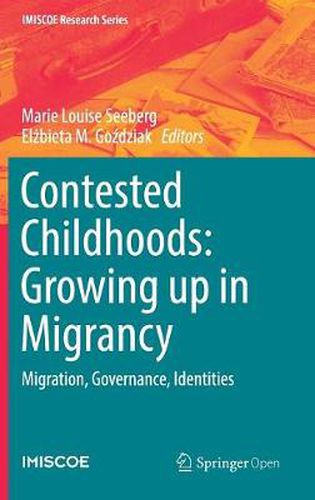Readings Newsletter
Become a Readings Member to make your shopping experience even easier.
Sign in or sign up for free!
You’re not far away from qualifying for FREE standard shipping within Australia
You’ve qualified for FREE standard shipping within Australia
The cart is loading…






This title is printed to order. This book may have been self-published. If so, we cannot guarantee the quality of the content. In the main most books will have gone through the editing process however some may not. We therefore suggest that you be aware of this before ordering this book. If in doubt check either the author or publisher’s details as we are unable to accept any returns unless they are faulty. Please contact us if you have any questions.
This book is open access under a CC BY-NC 2.5 license. This open access book explores specific migration, governance, and identity processes currently involving children and ideas of childhood. Migrancy as a social space allows majority populations to question the capabilities of migrants, and is a space in which an increasing number of children are growing up. In this space, families, nation-states, civil society, as well as children themselves are central actors engaged in contesting the meaning of childhood. Childhood is a field of conceptual, moral and political contestation, where the ‘battles’ may range from minor tensions and everyday negotiations of symbolic or practical importance involving a limited number of people, to open conflicts involving violence and law enforcement. The chapters demonstrate the importance of how we understand phenomena involving children: when children are trafficked, seeking refuge, taken into custody, active in gangs or in youth organisations, and struggling with identity work. This book examines countries representing very different engagements and policies regarding migrancy and children. As a result, readers are presented with a comprehensive volume ideal for both the classroom and for policy-makers and practitioners. The chapters are written by experts in social anthropology, human geography, political science, sociology, and psychology.
$9.00 standard shipping within Australia
FREE standard shipping within Australia for orders over $100.00
Express & International shipping calculated at checkout
This title is printed to order. This book may have been self-published. If so, we cannot guarantee the quality of the content. In the main most books will have gone through the editing process however some may not. We therefore suggest that you be aware of this before ordering this book. If in doubt check either the author or publisher’s details as we are unable to accept any returns unless they are faulty. Please contact us if you have any questions.
This book is open access under a CC BY-NC 2.5 license. This open access book explores specific migration, governance, and identity processes currently involving children and ideas of childhood. Migrancy as a social space allows majority populations to question the capabilities of migrants, and is a space in which an increasing number of children are growing up. In this space, families, nation-states, civil society, as well as children themselves are central actors engaged in contesting the meaning of childhood. Childhood is a field of conceptual, moral and political contestation, where the ‘battles’ may range from minor tensions and everyday negotiations of symbolic or practical importance involving a limited number of people, to open conflicts involving violence and law enforcement. The chapters demonstrate the importance of how we understand phenomena involving children: when children are trafficked, seeking refuge, taken into custody, active in gangs or in youth organisations, and struggling with identity work. This book examines countries representing very different engagements and policies regarding migrancy and children. As a result, readers are presented with a comprehensive volume ideal for both the classroom and for policy-makers and practitioners. The chapters are written by experts in social anthropology, human geography, political science, sociology, and psychology.